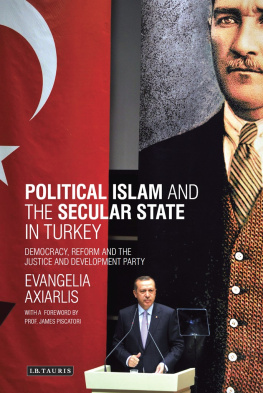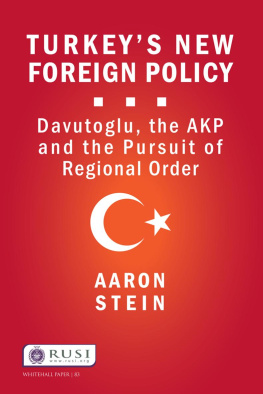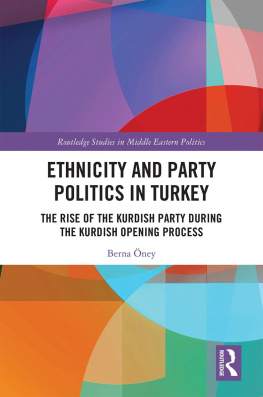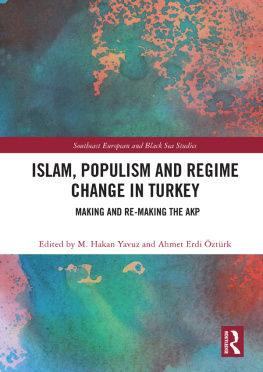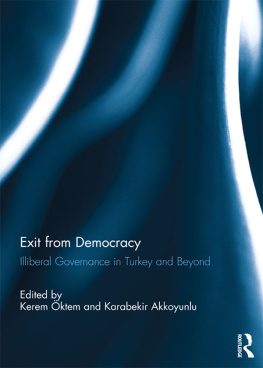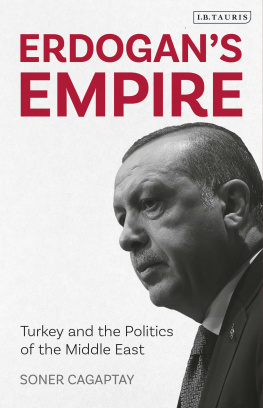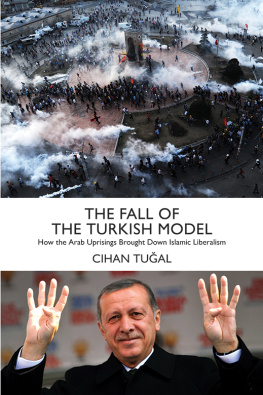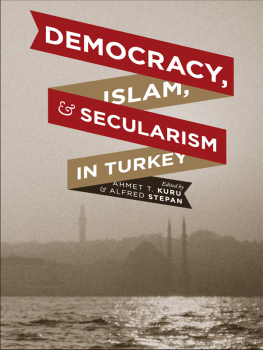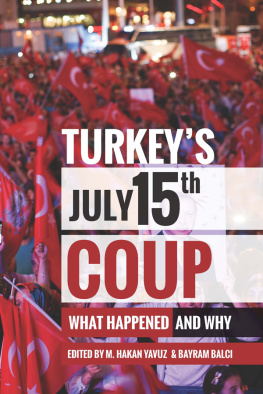Evangelia Axiarlis holds a PhD from the University of Melbourne, and is a specialist in Islam and the politics of Turkey.
Published in 2014 by I.B.Tauris & Co Ltd
6 Salem Road, London W2 4BU
175 Fifth Avenue, New York NY 10010
www.ibtauris.com
Distributed in the United States and Canada
Exclusively by Palgrave Macmillan
175 Fifth Avenue, New York NY 10010
Copyright 2014 Evangelia Axiarlis
Copyright foreword 2014 James Piscatori
The right of Evangelia Axiarlis to be identified as the author of this work has been asserted by the author in accordance with the Copyright, Designs and Patent Act 1988.
All rights reserved. Except for brief quotations in a review, this book, or any part thereof, may not be reproduced, stored in or introduced into a retrieval system, or transmitted, in any form or by any means, electronic, mechanical, photocopying, recording or otherwise, without the prior written permission of the publisher.
Library of Modern Turkey 11
ISBN: 978 1 78076 923 3
eISBN: 978 0 85773 798 4
A full CIP record for this book is available from the British Library
A full CIP record for this book is available from the Library of Congress
Library of Congress catalog card: available
To smail, for reading the play. And to Asiya and shak, who already love books.
FOREWORD
The modern political history of Turkey has not followed a preordained path. A post-imperial nationalist revolution has come to seek admission to a pan-European union, an official secular order has brought an Islam-sensitive political party to power for over a decade, and a democratically elected government has stimulated popular rather than military opposition. At the heart of this evolving politics has been the perennial tension between the secular and religious, which this book insightfully documents.
As a society with an intermittently functioning democracy, Turkey has seen a number of religious-based parties compete for power and other parties frame their positions in terms of Islam. Necmettin Erbakan became the first Islamist prime minister in 1996. Refah Partisi (the Welfare Party) regularly secured between 6 and 7 per cent of the vote in the 1980s when the very successful prime minister and president, Turgut zal, advocated ways of integrating Islam into national life. By the early 1990s, Refah had broadened its base, securing control of key cities such as Istanbul and Ankara, and eventually entered government.
Refahs success was to prove short-lived, however. The military, self-appointed guardians of the Kemalist legacy of laicism, became increasingly nervous, and by mid-1997 Refah was closed and Erbakan resigned. In January 1998, the constitutional court proscribed the party for anti-secular activities and prohibited Erbakan and other leaders from political activity for five years. The popular mayor of Istanbul, Recep Tayyip Erdoan, was imprisoned and banned for life from political activism. Yet the movement displayed some resilience when it re-emerged as the Virtue Party (Fazilet Partisi), and although it placed only third in the parliamentary election of April 1999, it secured slightly more than one-fifth of the seats.
A new generation of pragmatists, led by Erdoan and Abdullah Gl, emerged. The party they formed, Adalet ve Kalknma Partisi (the Justice and Development Party or AKP), won 34 per cent of the vote in the November 2002 elections and formed a single-party government. It was re-elected by a landslide in 2007, with 47 per cent of the vote, after the military had expressed its opposition to Gls presidential candidacy, and increased its vote in the election of 2011 to just under 50 per cent. Far from what had seemed his destiny in the late 1990s, Erdoan became prime minister five short years later and has since, ironically, emerged as the most dominant figure in Turkish politics since Atatrk himself.
Although the AKP denies that it is an Islamist party, and, as this work shows, it is not a simple second-generation version of Refah, it shares some characteristics with the latter. Both in power have followed mixed policies, combining sensitivity to conservative Muslim opinion with the pragmatism and interest-based calculations to be expected of any government. During the 18 months that it was in the ruling coalition, Refah spoke of the need for an Islamic-oriented foreign policy and criticised the European Union and United Nations as Zionist organisations, yet tolerated the Turkish Israeli security arrangement and supported NATO. It officially endorsed secularism and spoke of the values of the centre, with an emphasis on human rights and democracy. The AKP has also been a supporter of NATO and of accession to the European Union. To this end, it has embarked on legal reform that has curtailed the power of the military and guaranteed civil liberties. It has criminalised violence against women and banned discrimination and harassment in the workplace, but prohibited retail sale of alcohol between 10 p.m. and 6 a.m. and banned all alcohol advertising and promotion. In foreign policy, it has in the past, like other Turkish governments, deployed the army against Kurdish separatists in northern Iraq, but also established warm relations with Hamas and other Islamist groups in the Middle East, particularly since the Arab Spring.
Some argue that the AKP is a post-Islamist party. With roots in earlier political programmes, it emerged under the watchful eye of the military and in competition with other parties, but also in reaction to the rigidity and tactical mistakes of earlier Islamist parties. What has emerged in Turkey is a hybrid political entity, neither simply exclusionary of religion in public life nor theologically defined or Sharia-governed. In the process, Turkeys political and social order has been transformed in small but discernible ways. The headscarf is now allowed in Islamic schools and the ban in universities is not enforced, despite a constitutional court ruling in 2008 that, invoking secularism as the founding principle of the republic, threw out a proposed constitutional amendment that was meant to lift the ban in the name of guaranteeing the right to education.
Secular liberals are increasingly wary, however. They are concerned about constitutional changes, especially the push for a more centralised presidential system, and resent restrictions on alcohol, abortion, the morning-after pill, public display of affection, and the rejection of a draft bill on gay rights. For them, this is inescapable evidence of Islamisation. But the protests that suddenly erupted at the end of May 2013 indicate that the primary concern has been what is perceived to be the increasing authoritarianism of a government allied with domestic and foreign capital. Although the immediate trigger for the protests were development plans for an Istanbul park compounded by a heavy-handed police response this project was widely seen as symptomatic of a neo-liberal agenda that has fuelled Turkeys vast economic growth since the 1980s and has particularly benefitted the AKP. An important component of the partys support base has been what are often called the pious bourgeoisie small- and medium-scale entrepreneurs who are both economically liberal and socially conservative. Their support for Erdoan and the AKP has paid off: there are now several billion dollars worth of privatisations a year, compared to several hundred millions in the period before the party came to power.
As the Muslim middle-class dimension suggests, there is no clear overlap between class and religious attitude, but narratives have hardened. For the mainstream Republican Peoples Party (CHP) and leftist groups, the AKPs behaviour is equivalent to undermining the Kemalist foundations of the republic; they fear, for example, that removal of mosques and religious schools from the control of the Ministry of Religious Affairs would enhance the position of Muslim institutions. For the AKP, their enemies, especially since the 2013 protests, are secular ideologues identifiable with the upper middle classes what Erdoan has called
Next page
